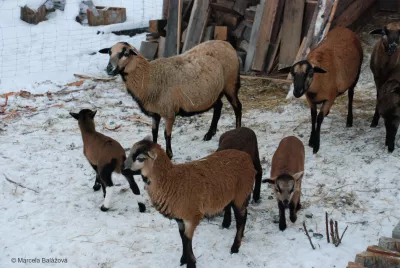General information
RDP Priority
- P2. Competitiveness
RDP Focus Area
- 2B: Entry of skilled/younger farmers
RDP Measure
- M06: Farm & business development
Summary
A small, young family struggling for income decided to go ahead and fulfill their dream of running an organic farm. Their main goals were to take good care of animals and produce high-quality eco foods, promoting the importance of eco-farming.
The CAP funds (including start-up aid for young farmers) were used to start a registered organic livestock farm by building agronomic facilities and purchasing livestock and bees. This has inspired the family farm to develop further.
Results
The following results were achieved:
- One new farm building and 52 beehives built, offering good and liveable conditions for the animals and bees.
- One on-farm job created.
- Successful production of organic honey sold not only in Slovakia but also abroad.
- In addition, the business has developed two new products and plans to develop more dairy products. Direct on-farm sales are also planned to help increase income and resilience.

Promoter
Marcela Balážová
Funding
Total budget 50 000 (EUR)
EAFRD 37 500 (EUR)
National/Regional 12 500 (EUR)
Ressources
Documents
Context
Mrs Balážová and her family live in a beautiful suburban area of the Stará Ľubovňa district, in the Slovak-Polish cross-border region. The area offers a lot in terms of agrotourism for families with children, including cycling, walking and fishing.
The family always yearned to farm and to be self-sufficient. They believe in eco-farming, producing healthy natural foods free of chemicals and keeping animals in good health thereby contributing to a sustainable future for all. However, due to the permanently high levels of unemployment in the region, Mrs Balážová’s husband needed to go overseas for work frequently, leaving her at home with the kids. This was an unsustainable situation and it was agreed to keep the family together instead, to raise additional finance and to acquire their own land to establish an organic farm. Learning about rural development funding opportunities, Mrs Balážová decided to apply for support to run a registered and organic livestock farm (bees, sheep and goats). She also used the opportunity to receive support for young farmers.
Objectives
The project had the following objectives to:
- Establish a registered organic livestock farm.
- Acquire animals and relevant equipment.
- Promote self-employment and rural development with a special focus on eco-farming and its potential for the future.
Activities
The implementation of the project involved the following activities:
- Constructing a farm building with a concrete foundation (50 m2), insulated, with a hayloft and a new roof.
- Buying 52 new quality beehives, including all the necessary equipment (made from natural material).
- Buying 24 sheep and Anglo Nubian goats.
- Participating in several workshops to learn about the processes of eco-farming for all types of eco products.
Main results
The following results were achieved:
- One new farm building and 52 beehives established, offering good and liveable conditions for the animals and bees.
- One on-farm job created.
- Successful production of organic honey sold not only in Slovakia but also abroad.
- In addition, the business has developed two new products since the investment and plans to develop more dairy products.
- The family also hopes to increase their income and resilience by developing their on-farm direct sales.
Key lessons and recommendations
The following key lessons were learned:
- Commitment and effort can generate successful rural development initiatives that support local economies in sustainable ways.
- New land certified as organic contributes to high level policy goals.
- Start-up aid for young farmers can significantly help establish organic production systems.
“The Government should support farmers because they need them, especially in rural regions with high long-term unemployment.”
Marcela Balážová
